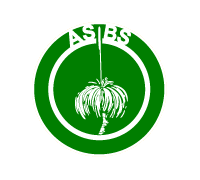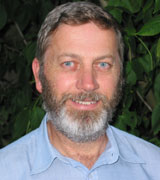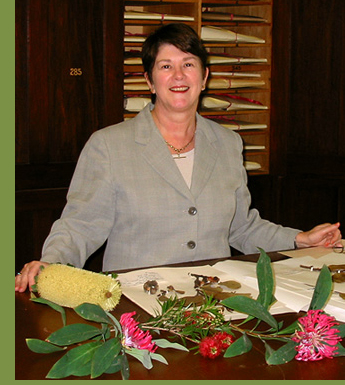
Student Support & AwardsStudent assistance to attend ASBS conferencesStudent assistance is available for most conferences of which the Australasian Systematic Botany Society is a sponsor. The amount available for student assistance is generally based on the early-bird student registration for the conference. Assistance will only be paid to student members of the Society who present either a talk or poster at the conference. If you wish to apply for student assistance to attend an ASBS conference please download and complete an application form (Word document) and submit it to the Secretary at least 4 weeks prior to the conference. Note: if you are seeking assistance to attend the Society's 2022 Student & Early Career Researcher conference in person, please don’t use the above form. Instead, please apply for a Postgraduate Student Travel Grant (see details below).
Postgraduate Student Travel GrantsThese grants are administered by ASBS and supported by the Australian Biological Resources Study (ABRS). They are intended to help to build Australia's research capacity for taxonomy and systematics by supporting postgraduate students. Scope The grants can fund:
Funding can include economy travel (by air, road or rail), accommodation, registration or other conference fees. Value Up to AU$1500 for international travel and AU$800 for domestic travel. The total value will be based on actual expenses paid, substantiated by receipts or institutional invoices. Travel to Australia will be considered international travel for students from New Zealand and Papua New Guinea. Eligibility These grants will be open to financial student members of ASBS who are enrolled in Masters or Ph.D. programs at a university in Australia, New Zealand or Papua New Guinea at the time of the relevant travel. Students must have the support of their primary research supervisor. A maximum of one grant per student will be awarded during the period of this program (July 2022 to November 2023). Grants will not be awarded where a student has previously obtained other grants (e.g., university or Society for Australian Systematic Biology travel grants) for the same expenses, but obtaining multiple grants covering different expenses for the same trip is acceptable and encouraged. Application deadlines Applications close at midnight on 23 September 2022 for travel in the period 1 June 2022 (can include retrospective application) to 30 November 2023. The application form is available for download via Google Docs. The portal for submitting applications is available at: https://forms.gle/EMBf4RABV4dGiH4Q6
OpportunitiesSome options for students are also posted on our 'Jobs & Opportunities' web page, check it out.
Pauline Ladiges Prize
The Inaugural award was given in 2008. The award is named in honour of Professor Pauline Yvonne Ladiges AO FAA in acknowledgement of her dedication to teaching, students and systematics. Pauline is a Professorial Fellow of the School of Botany at the University of Melbourne where from 1992 to 2010 she was the Head of the School of Botany, The University of Melbourne. Professor Ladiges was appointed to a "Personal Chair" at the University of Melbourne in recognition of her scientific discoveries and leadership within the university. She has published more than 120 scientific articles in refereed journals of international standing, published eight book chapters, edited four special volumes, co-authored two biology textbooks for secondary education, and co-edited and co-authored the first substantial Australian biology textbook used in tertiary institutions. These three books have won prizes for Best Australian Textbook and Awards for Excellence in Australian Publishing. Her research is in the field of plant ecology (predominantly 1974-1982) and phylogenetic systematics and historical biogeography (1983- present). She studies the evolutionary relationships and history of the Australian flora, particularly in relation to the botanical differentiation of geographic areas during the geological history of the continent. Lately Professor Ladiges and her research group have been elucidating the phylogeny of large Australian plant genera, including the eucalypts and acacias using molecular (DNA) and morphological techniques. Pauline has had a distinguished career which has been recognised by a number of awards which include:
The above is an extract from ASBS Newsletter 137: 4-5 (2008); 138: 21 (2009). Recipients
| |||||||||||||||||||||||||||||||||||||||||||||||||||||||||||||||||||||||||||||||||||||||||||||||||||||||||||||||||||||||||||||||||||||||||||||||||||||||||||||||||||||||||||||||||||||||||||||||||||||||||||||||
Year |
Recipient |
Institution |
Conference |
Title of Presentation |
Newsletter |
Photo |
| 2019 | Helen Kennedy | University of New England, New South Wales, Australia | Wellington | Revising Melichrus: a deep dive into the past, present and future of the urn heaths | ||
| 2018 | Jessica Bruce | Edith Cowan University, Western Australia | Brisbane | Reedia spathacea phylogeography and population structure | ||
| 2017 | Elizabeth Joyce | James Cook University, Cairns | Adelaide | Origins of the northern Australian flora: role of the Sunda-Sahul floristic exchange |  |
|
| 2016 | Tim Collins | University of New England | Alice Springs | Would you like a new species and a fertile hybrid with that? Eucalyptus magnificata is not just an endangered species | ||
| 2015 | Ben Anderson | University of Western Australia | Canberra | Using genotyping by sequencing to resolve the evolutionary relationships in a species complex of Australian arid zone grasses (Triodia) |  |
|
| 2014 | Jessie Prebble | Massey University and Te Papa | Palmerston North, NZ | The population genetics of rarity in New Zealand plants: a case study delimiting species in recent radiations using Myosotis (Boraginaceae) | 161: 28 | |
| 2013 | Kaylene Bransgrove | Australian Tropical Herbarium, James Cook University | Sydney | Mountain-top fungal endophytes of the wet tropics, Queensland: biodiversity, host specificity, biogeography and systematics | 157: 22 | |
| 2012 | Lalita Simpson | Australian Tropical Herbarium, James Cook University | Perth | Mind the gap: phylogeography and taxonomy of the Dendrobium speciosum complex (Orchidaceae) |
153: 3 | |
| 2011 | ASBS Conference was held as part of the International Botanical Congress and no student prizes were offered | |||||
| 2010 | Caroline Puente-Lelievre | Australian Tropical Herbarium, James Cook University | Lincoln, NZ | Crossing the ditch? Historical biogeography of the trans-Tasman Styphelieae (Styphelioideae, Ericaceae) | 144–5: 18 |  |
2009 |
Mark Wallace |
University of Western Australia |
Armidale |
Using flow cytometry to investigate ploidy distribution: an example from the Lepidosperma costale (Cyperaceae) species complex |
|
|
2008 |
Trevor Wilson |
University of Sydney |
Adelaide |
Does traditional classification of Prostanthera dictate how pollination has evolved? |
 |
|
ASBS Poster Prize
The Poster Prize is awarded to the best poster presentation by a student at an ASBS conference.
The prize is sponsored by CSIRO.
Recipients
Year |
Recipients |
Institution |
Conference |
Title of Poster |
Newsletter |
Photo |
2019 |
Francis Nge | University of Adelaide, Australia | Wellington | Biogeography of Pomaderris (Rhamnaceae) across the ditch |
|
|
2018 |
Helen Kennedy | University of New England | Brisbane | Integrative taxonomic revision of Melichrus (Ericaceae) |
|
|
2017 |
No Poster Prize awarded | |||||
2016 |
Charles Foster | University of Sydney | Alice Springs | There goes Thecanthes: molecular systematics expands the circumscription of Pimelea | ||
2015 |
Charles Foster | University of Sydney | Canberra | Estimating the evolutionary timescale of flowering plants using complete cp genome sequences |  |
|
2014 |
Sarah Wright | University of Canterbury, New Zealand | Palmerston North, NZ | Connecting the dots: a population genetic study of the disjunctly distributed species Pittosporum obcordatum | ||
2013 |
Sook-Ngoh Phoon | Australian Tropical Herbarium, James Cook University | Sydney | How many taxa in the West Malesian Elaeocarpus polystachyus group? Evidence from morphometric analysis | ||
2012 |
Benjamin Anderson | University of Western Australia | Perth | A revision of Rhynchotechum (Gesneriaceae) | ||
2011 |
ASBS Conference was held as part of the IBC and no student prizes were offered | |||||
2010 |
Austin Brown | National Herbarium of Victoria and The University of Adelaide | Lincoln, NZ | Morphological comparisons in Lachnagrostis across the ditch |  |
|
2009 |
Bort Edwards
|
University of Queensland |
Armidale
|
Drawing a line in the sand: differentiation between Melaleuca argentea and M. fluviatilis, two ecologically similar members of the broadleaf paperbark complex
|
|
|
Bob Anderson Memorial Student Award
A student from a developing country who presents a talk or poster at the annual conference of the Australasian Systematic Botany Society is eligible for The Bob Anderson Memorial Student Award. This award is judged and awarded to an eligible student attending the conference and no application is required.
Recipients
Year |
Recipient |
Institution |
Conference |
2019 |
Raees Khan | University of Adelaide, Australia | Wellington |
2018 |
Chapa Manawaduge | Queensland University of Technology, Brisbane | Brisbane |
2017 |
Rismita Sari | James Cook University, Cairns | Adelaide |
2016 |
Isaac Kerr | University of Adelaide | Alice Springs |
2015 |
Janet Gagul | James Cook University, Cairns | Canberra |
2014 |
Hernan Retamales | Queensland University of Technology | Palmerston North, NZ |
2013 |
Joshua Buru | Queensland University of Technology | Sydney |
Previously-Offered Awards
Australian Conservation Taxonomy Award
The Australian Conservation Taxonomy Awards were designed to foster research by young scientists into important taxonomic problems that have significant implications for conservation in Australia. The Nature Conservancy created these awards, thanks to generous support from The Thomas Foundation. Awards were offered from 2012–2016, with support for plant systematics projects in 2012 and 2013 and with separate Botany and Zoology awards from 2014–2016.
Both the Botany and Zoology awards included $5000 toward research costs. The Botany award also included up to $2000 to assist with attendance at two ASBS conferences. Judging of awards was conducted by The Nature Conservancy with the assistance of the ASBS Research Committee (Botany Award) and Society of Australian Systematic Biologists (Zoology Award).
Past Australian Conservation Taxonomy Award Recipients
2016
Zoology award:
- Danielle Stringer, The University of Adelaide, "Investigating the evolution and systematics of endemic Haloniscus isopods (Oniscidea: Scyphacidae) from arid zone groundwater-dependent ecosystems using next generation sequencing techniques".
- Charles Foster, University of Sydney, "Using high-throughput sequencing to resolve the complicated evolutionary history of rice flowers (Pimelea: Thymelaeaceae)".
2015
Zoology award:
- Kirilee Chaplin, The University of Melbourne and Museum Victoria, "Taxonomy, ecology and conservation genetics of grassland earless dragons (Agamidae: Tympanocryptis spp.) in north-eastern Australia".
- James Clugston, RBG Sydney (enrolled at the University of Edinburgh), "Exploring new approaches for conservation genetics of Cycas calcicola Maconochie (Cycadaceae) in Australia".
- Rachael Fowler, The University of Melbourne and RBG Victoria, "The genus Eremophila in Australia's arid zone: phylogeny and biogeography in South Australia".
2014
Zoology award:
- James Shelley, The University of Melbourne, "The Kimberley Ark: assessing and conserving freshwater fish biodiversity in Australia’s last pristine river systems".
2013:
Botany award:
- Lalita Simpson, James Cook University, "What is at risk? Phylogeography and taxonomy of orchids endemic to Queensland’s mountain top biodiversity hotspots".
2012:
Botany award:
- Todd McLay, The University of Melbourne, "Classification, phylogeny and conservation of Xanthorrhoea in Western Australia".
 The Pauline Ladiges Prize is awarded to the best oral presentation by a student at an ASBS conference. The prize is sponsored by CSIRO.
The Pauline Ladiges Prize is awarded to the best oral presentation by a student at an ASBS conference. The prize is sponsored by CSIRO.
